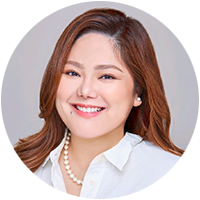Elisse Catalan MD, MPH, MSc | Leadership in Medicine: Southeast Asia
Elisse Catalan has no shortage of respected medical degrees from highly regarded institutions. Catalan is a registered nurse and medical doctor who earned her credentials from her home country of the Philippines. After completing her MD, she went on to complete two masters programs—one in public health at Mount Sinai in New York; the other a master’s of science in health care management from Johns Hopkins.
Yet after returning to Asia where she accepted a position in Singapore, Catalan realized she could benefit from one more program—Harvard Medical School's postgraduate program Leadership in Medicine: Southeast Asia (LIM:SEA).
“I received the job offer in Singapore the same week I was accepted in the [LIM:SEA] program,” recalls Catalan. “It was serendipitous, and I knew that it would provide me with a bigger scope to be most effective in my new position; the first time I had worked in Asia since leaving for my post-medical school studies in the United States.”
As manager of Southeast Asia Operations for a large private health care system, Catalan joins a team whose responsibility is managing various projects in Southeast Asian markets. Her employer in Singapore is the largest private health care system in the country.
She is involved in building new hospitals and identifying synergies between the hospitals in her company’s network, which includes 80 hospitals in 10 countries.
Capstone Project Now Being Implemented
The LIM:SEA program involves three, week-long workshops: the first two in Malaysia with the third in Boston. Catalan completed her final course just as the COVID-19 pandemic was closing borders in early March 2020. But by then, she and her colleagues had developed their graduation capstone project which Catalan brought back to her employer in Singapore.
An individual capstone project is a core requirement in the LIM:SEA program. “I chose to tackle the digitalization of laboratory test ordering; it was something that was always in the backburner, and no one previously had the bandwidth or initiative to spearhead,” says Catalan. She was assigned one capstone advisor, Asaf Bitton MD, MPH, to guide her throughout the process. “His feedback was invaluable because he had very helpful insights about implementing change in health care.” She went on to win first prize in the capstone research proposal, earning her a distinction.
Real-Life Professional Goal
What started as a project soon became a real-life professional initiative for Catalan back in Singapore. Having worked on its fundamentals from October 2019 to March 2020 when she completed the LIM:SEA program, Catalan spent the majority of the COVID-19 pandemic in Singapore learning how to lead and implement the new system.
Catalan faced challenges on two fronts: developing a new electronic ordering system and influencing a large number of outpatient clinic practices to accept it. In publicly owned clinic networks in Singapore, the doctors are all employed by the state. But that is not the case for private companies, such as Catalan’s. “They all have their own way of doing things and they don’t necessarily share the same systems,” she says. Making changes in that environment requires not just technical expertise but serious management skills as well.
“I learned so much from the [LIM:SEA] program that I was confident to present it to my direct superior, test it in a few hospital based clinics, and then roll it out over the past year,” she says. “And I knew that people would react differently to the changes so I learned how to be more methodological with introducing the system.”
Cultural Sensitivity
“I chose the program because it was very specific to Southeast Asia, and for me, provided a good reintroduction having left Asia for a while,” says Catalan. “Yet there was also a global context to it.”
Catalan credits the Leadership in Medicine: Southeast Asia program with helping her develop and implement her new system in a culturally sensitive way.
“I’ve been in Asian and American classrooms,” she says. “In America, they are very bold and forthcoming and everyone gives you feedback right away. Asia is very different. I learned I had to value and ask for the feedback of my more experienced colleagues and gain from their ideas.”
Her colleagues included a regional mix of professionals from Malaysia, Brunei, Myanmar, the Philippines, as well as Singapore and other countries. “They remain an important network and we keep in regular contact,” she says.
Confidence and New Tools
The Leadership in Medicine: Southeast Asia program provided Catalan with a morale boost as well as new tools. “It might sound cliché but it gave me the right tools at the right time for the right context,” she says. “Plus, it helped build my confidence having finished a really difficult program; I feel like I can take on more complicated projects and do them well.”
Learn more about Leadership in Medicine: Southeast Asia.
Written by Alice McCarthy
